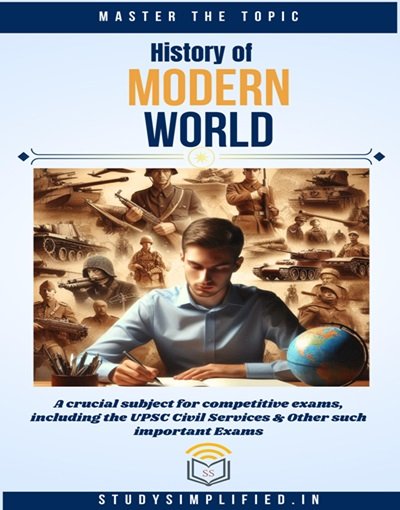From Revolution to Globalization: History of Modern World


About History of Modern World Book
This Book mainly focuses on the following World Events in detail:
- World Wars (1914–1945)
- World War I (1914–1918): A global conflict involving major powers, resulting in significant political and territorial changes.
- World War II (1939–1945): An even more devastating war, leading to the Holocaust, the division of Germany, and the emergence of superpowers.
- League of Nations (1920–1946)
- Founded after World War I to promote peace and cooperation among nations.
- Failed to prevent World War II due to its limited power and lack of enforcement mechanisms.
- The Cold War (1945–1991)
- A non-physical conflict between the United States (capitalism) and the Soviet Union (communism).
- Proxy wars, nuclear arms race, and ideological competition characterized this era.
- Communism in USSR, Russia, and China
- USSR (Soviet Union):
- Led by Joseph Stalin, the USSR became a superpower after World War II.
- Centralized planning, collectivization, and repression marked its communist regime.
- Russia (Post-USSR):
- The collapse of the USSR in 1991 led to Russia’s transition to a market economy.
- Challenges included political instability, oligarchy, and economic reforms.
- China:
- Mao Zedong established communist rule in 1949.
- The Great Leap Forward and the Cultural Revolution had significant impacts.
- USSR (Soviet Union):
- Conflicts in the Middle East
- Arab-Israeli Conflict:
- Tensions between Israel and neighboring Arab states over land and identity.
- Iran-Iraq War (1980–1988):
- A brutal conflict with regional implications.
- Gulf Wars (1990–2003):
- Iraq invaded Kuwait, leading to international intervention.
- Arab-Israeli Conflict:
- Rise of Fascism in Italy and Germany
- Italy:
- Benito Mussolini’s fascist regime emphasized nationalism and authoritarianism.
- Germany:
- Adolf Hitler’s Nazi Party rose to power, leading to World War II and the Holocaust.
- Italy:
- Decolonization Era (1940s–1960s)
- Colonized nations sought independence from European powers.
- India, Ghana, Algeria, and others gained sovereignty.
- Changing World Economy & Globalization
- Post-World War II economic growth, technological advancements, and trade.
- Globalization accelerated, connecting economies, cultures, and communication.
Why reading History of Modern World is important for Competitive Exams?
- Understanding of Current Events: Modern history provides context for current global issues. You’ll see how past events shaped political systems, alliances, and conflicts that continue today.
- Improved Critical Thinking: Analyzing historical events helps develop critical thinking skills. You’ll learn to weigh evidence, identify cause and effect, and form informed opinions.
- Vocabulary Building: Competitive exams often test vocabulary related to historical events and figures.
- Essay Writing Skills: Many exams require writing essays about historical topics. Understanding historical context strengthens your arguments and provides relevant examples.
- General Knowledge (GK) Boost: Many competitive exams have a General Knowledge section. Familiarity with Modern History provides a strong foundation for answering GK questions.
- Understanding of Power Dynamics: Competitive exams for government jobs often test knowledge of international relations and diplomacy. Studying modern history gives you insight into how power structures have evolved and continue to influence global affairs.
- Exam-Specific Benefits: Some exams may have dedicated sections on Modern History. Knowing the syllabus and focusing on relevant events can give you an edge.
By studying Modern World History, you gain a deeper understanding of the world around you and develop valuable skills that can be applied to various competitive exams.
Contents of the Book on History of Modern World
- First World War
- Second World War
- The Cold War
- Spread Of Communism
- United Nations Organization
- War in the Middle East
- War Against Global Terrorism
- Appearance Of Fascism
- Communism Dynamics
- Happenings In United States Of America
- Decolonization And Aftermath
- Changing World Economy
Why Reading History of Modern World is required for Exams?
Many competitive exams across different fields incorporate questions related to Modern World History. Here are some prominent examples:
- Civil Services Exams: UPSC Civil Services Exam (India), State PSC , and similar state-level and national level exams often test knowledge of Modern History, focusing on events that shaped the nation and the world.
- History Entrance Exams: Exams for postgraduate studies in history, like MA in History or M.Phil, will heavily test your understanding of Modern World History.
- International Relations Exams: Exams for programs like International Relations (IR) or Masters in International Studies (MIS) will likely feature questions on major events, political ideologies, and international organizations that emerged in the Modern Era.
- General Knowledge Exams: Exams with a General Knowledge (GK) section often include questions on prominent figures, key events, and significant developments in Modern World History. These could be bank exams, management entrance exams, or even scholarship exams.
More Links to follow
UPSC – https://upsc.gov.in/
History of Modern India – https://studysimplified.in/history-of-modern-india-complete-book-read/
